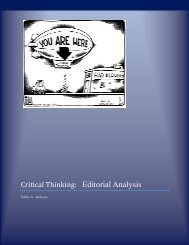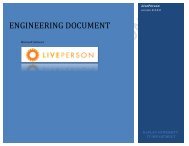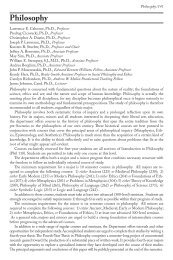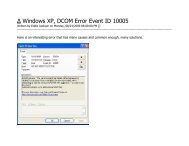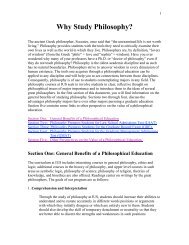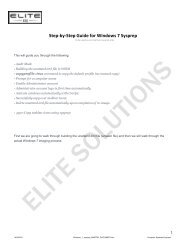Guide to the Study of Philosophy - Eddie Jackson
Guide to the Study of Philosophy - Eddie Jackson
Guide to the Study of Philosophy - Eddie Jackson
Create successful ePaper yourself
Turn your PDF publications into a flip-book with our unique Google optimized e-Paper software.
<strong>of</strong> that support; if you agree, you can defend it against possible attacks.<br />
• Support your <strong>the</strong>sis<br />
Don't just state your own position; make it <strong>the</strong> conclusion <strong>of</strong> a line <strong>of</strong> reasoning.<br />
Claim only what you can prove (or are, at least, prepared <strong>to</strong> defend), and support<br />
it with evidence and argument. <strong>Philosophy</strong> is not just a list <strong>of</strong> true opinions, but<br />
<strong>the</strong> reasoned effort <strong>to</strong> provide justification.<br />
• Consider alternatives<br />
Be sure <strong>to</strong> explore arguments on all sides <strong>of</strong> <strong>the</strong> issue you address. Of course you<br />
will want <strong>to</strong> emphasize <strong>the</strong> reasoning that supports your <strong>the</strong>sis, but it is also<br />
important <strong>to</strong> consider likely objections and <strong>to</strong> respond with counter-arguments. Be<br />
especially carefully in your use <strong>of</strong> examples: <strong>the</strong> best positive example can only<br />
clarify meaning and lend some evidentiary confirmation, but a single counterexample<br />
disproves a general claim completely.<br />
• Omit <strong>the</strong> unnecessary<br />
Include in your written work only what is germane <strong>to</strong> your <strong>to</strong>pic: after <strong>the</strong> first<br />
draft, mercilessly eliminate from your text anything that does not directly and<br />
uniquely support <strong>the</strong> <strong>the</strong>sis. Padding with irrelevant or redundant material is never<br />
worthwhile. Be particularly careful in your use <strong>of</strong> material prepared by o<strong>the</strong>rs: do<br />
not plagiarize, paraphrase without attribution, quote directly <strong>of</strong>ten or at length, or<br />
rely extensively on a single secondary source.<br />
• Write clearly<br />
It is your responsibility as writer <strong>to</strong> express yourself in a way that can be<br />
unders<strong>to</strong>od. Use specific, concrete language in active voice whenever you can.<br />
Define your terms explicitly and use <strong>the</strong>m consistently throughout your paper.<br />
Finally, you may find it helpful <strong>to</strong> keep an appropriate audience in mind as<br />
you write. Don't write just for <strong>the</strong> instruc<strong>to</strong>r and your classmates—that is, don't<br />
assume that your audience has pr<strong>of</strong>essional knowledge <strong>of</strong> <strong>the</strong> philosophical texts<br />
or <strong>to</strong>tal awareness <strong>of</strong> every conversation that has taken place, inside and outside<br />
<strong>the</strong> classroom. Unless o<strong>the</strong>rwise directed by <strong>the</strong> details <strong>of</strong> a particular assignment,<br />
think <strong>of</strong> yourself as presenting <strong>the</strong> material <strong>to</strong> a friend, your parents, or a class:<br />
intelligent, interested people who are well-informed generally but who lack your<br />
knowledge <strong>of</strong> <strong>the</strong> philosophical issues. Write <strong>to</strong> teach.




